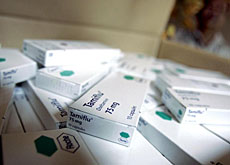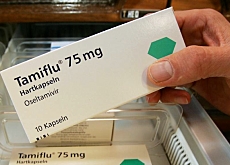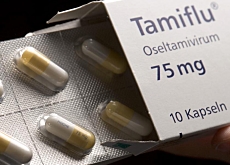Roche opens Tamiflu to outside firms

Swiss pharmaceutical giant Roche has granted the first sub-licensing agreement for the overall production of its anti-flu drug Tamiflu.
The company also confirmed on Monday two of 12 potential partners chosen for the production of the drug, which protects against flu.
Roche said it had granted the sub-licence for the production of oseltamivir, Tamiflu’s active ingredient, to the Shanghai Pharmaceutical Group in China. It added it was in further negotiations for local partnerships in other countries, including India.
“It’s a sub-licence to produce and distribute a generic version of Tamiflu, or rather oseltamivir,” Roche spokesman Daniel Piller told swissinfo. “We have a licence from Gilead, the inventor, and we sub-licence it.”
Roche has granted Shanghai Pharmaceutical the right for the overall production of oseltamivir for pandemic use in China.
“They are allowed to and they will produce the drug from the beginning to the end,” Piller said. “But they can only use it for pandemic purposes within China.”
Copy risk
Roche has come under international pressure to ease its monopoly on the manufacture of Tamiflu, which is considered the most efficient treatment in the case of an outbreak of bird flu affecting humans.
The disease has killed 70 people since it swept through Asia in 2003.
Roche said it had already brought forward delivery schedules for countries with or near large bird flu outbreaks. It has also allowed Vietnamese companies to encapsulate Tamiflu locally.
However, Tamiflu is not protected by patent in Indonesia, Thailand or the Philippines, where firms are free to begin making their own versions of the drug.
Piller said Roche was aware of the risks of cheap copies.
“That’s a question for Shanghai Pharmaceutical,” he said. “Of course there’s always a risk but in recent years patent rights in China have been enforced more and more by the government.”
Potential partners
Roche said it compiled the shortlist of 12 potential partners, which it did not name, after evaluating around 200 applicants interested in helping with certain steps in the manufacture of Tamiflu. It did not say how many it would finally choose.
It did however confirm the 12 included Mylan Laboratories of Pittsburgh and Israeli drug maker Teva Pharmaceutical Industries.
“It’s too early to talk about any other names because these are potential partners and what is needed now is in-depth discussions,” Piller said.
He said Roche would mainly use the partners, which include major pharmaceutical makers, large generic manufacturers and specialty chemical producers, as a back-up to meet specific regional needs and to prepare for any large additional government orders in the future.
“They would in any case not produce Tamiflu from A to Z. They could become part of our production network which would mean that they would just do one step of the production,” he added.
swissinfo
Tamiflu was invented by California-based Gilead and licensed to Roche in 1996.
The oral treatment has proven effective against influenza A and B and the avian H5N1 strain of influenza which has killed 70 people in Asia since 2003.
In preparation for a possible bird flu pandemic, governments are stockpiling the drug. So far Roche has received bulk orders from around 50 countries.
Switzerland is to stockpile enough Tamiflu to cover 25 per cent of the population.
On Friday Swiss Interior Minister Pascal Couchepin said the government intended to stockpile enough Tamiflu, an antiviral used in the treatment of bird flu, for a quarter of the population.
No vaccine for bird flu is ready for commercial production.
However, a vaccine is under development in several countries, and the Swiss government said it wants to purchase enough of this vaccine for 100,000 people.
The government has placed an order with French pharmaceuticals company Sanofi Pasteur, which is still putting the vaccine through trials.
The health ministry said the vaccine would start being delivered in 2006.

In compliance with the JTI standards
More: SWI swissinfo.ch certified by the Journalism Trust Initiative



You can find an overview of ongoing debates with our journalists here. Please join us!
If you want to start a conversation about a topic raised in this article or want to report factual errors, email us at english@swissinfo.ch.